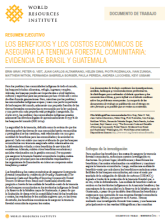Land Library
Welcome to the Land Portal Library. Explore our vast collection of open-access resources (over 74,000) including reports, journal articles, research papers, peer-reviewed publications, legal documents, videos and much more.
/ library resources
Showing items 1 through 9 of 9.This document aims to contribute to the empirical development of effective approaches for the assessment of rangeland governance at local levels, and provide insights about major governance drivers through the quantitative assessment of their effects.
In response to the severe economic, social, and environmental costs of degradation across Tunisia’s rangelands, the International Center for Agricultural Research in the Dry Areas (ICARDA) has worked with the General Directorate of Forestry (Direction Générale des Forêts, DGF) to draw up a new pa
The agricultural development on newly reclaimed lands has led to many national debates about food
security and budget deficits, and the living conditions of the new settlers at the local level. This debate
Encroaching on Land and Livelihoods examines whether national expropriation laws in 30 countries across Asia and Africa follow the international standards established in Section 16 of the Voluntary Guidelines on the Responsible Governance of Tenure of Land, Fisheries, and Forests in
Evidence is growing that tenure-secure community forests are associated with avoided deforestation and other ecosystem-service benefits. There are also economic and social benefits connected to communal management.
La seguridad de la tenencia, definida como la certeza de que los derechos sobre las tierras de una comunidad serán reconocidos y protegidos si se los cuestiona, está relacionada con una gran cantidad de beneficios para las comunidades y la sociedad en general.
The Chinyanja Triangle (CT) is an area inside the Zambezi
River Basin, inhabited by Chinyanja-speaking people
sharing a similar history, language and culture across
the dryland systems of the eastern province of Zambia,
The dry rangelands of West Asia and North Africa are fragile and severely degraded due to low rainfall and mismanagement of natural resources. Rainwater harvesting (RWH) interventions are used to increase soil moisture content, vegetation cover, and productivity.
The Fourth Assessment Report of the Intergovernmental Panel on Climate Change (IPCC) and other research, predict a significant future increase in the frequency and intensity of heavy rainfall events in many regions.









